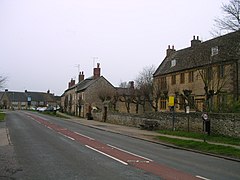Aynho
| Aynho | |
|---|---|
 | |
Location withinNorthamptonshire | |
| Population | 632 (2001 census[1]) 659 (2011 census.)[2] |
| OS grid reference | SP5133 |
| Civil parish |
|
| District | |
| Shire county | |
| Region | |
| Country | England |
| Sovereign state | United Kingdom |
| Post town | Banbury |
| Postcode district | OX17 |
| Dialling code | 01869 |
| Police | Northamptonshire |
| Fire | Northamptonshire |
| Ambulance | East Midlands |
| UK Parliament | |
Aynho(/ˈeɪnhoʊ/,formerly speltAynhoe) is a village andcivil parishinWest Northamptonshire,England,on the edge of theCherwellvalley 6 miles (9.7 km) south-east of the northOxfordshiretown ofBanbury[3]and 7 miles (11 km) southwest ofBrackley.
Along with its neighbourCroughton2 miles (3.2 km) to the east, it is one of the two southernmost villages inNorthamptonshire.
It is the southernmost settlement in Northamptonshire and indeed the entire EnglishEast Midlandsregion.
History
[edit]Aynho was founded inAnglo-Saxontimes. Thetoponymis derived fromAienho,Old Englishfor a spring, grove or hill. The circular village was surrounded by a defensive wall, parts of which can still be seen.
In the 11th century Asgar, a Saxonthegnand standard bearer toEdward the Confessorowned themanorof Aynho. After theNorman conquest of Englandhe was forced to cede the manor toGeoffrey de Mandeville,whose family retained it for several generations. Later the manor passed through the Clavering, Neville, Fitzalan, Shakerley, Tracy and Marmion families. Late in the 16th centuryAynhoe Parkwas sold to Richard Cartwright (born 1563, a barrister and member of theInner Temple,from aCheshirefamily) who moved to Aynho in 1616. It then remained in the Cartwright Family for over three hundred years.
Late in the 12th century Roger and Alice FitzRichard founded the Hospital of Saints James and John in Aynho to care for the poor, the sick and the infirm.[4]Their son Robert FitzRoger and subsequent benefactors increased the endowments of the hospital but in the 15th century it declined.[4]In 1483 the16th Earl of Arundelgranted the hospital'sadvowsonand patronage toWilliam Waynflete,Bishop of Winchester.[4]In 1458 Waynflete had foundedMagdalen College, Oxfordand in 1485 he granted the hospital to the college.[4]At some time thereafter the hospital seems to have become a private house.[4]
Notable buildings
[edit]The village churchofSaint Michaelhas a 14th-centuryDecorated Gothictower.[5]The rest of the church was demolished in 1723 and rebuilt over the next two years inneoclassicalstyle.[5]The interior retains itsGeorgianpulpit,box pewsandwest gallery.[5]
A Tudoryeoman's house was turned into a freeGrammar Schoolfounded in 1654 by John Cartwright, and later became thedower houseof the Manor ofAynhoe Parkon the southern edge of the village.[6]
Aynhoalmshouseswere built in 1822.[7]
Transport history
[edit]Aynho Junction | |||||||||||||||||||||||||||||||||||||||||||||||||||||||||||||||||||||||||||||||||
|---|---|---|---|---|---|---|---|---|---|---|---|---|---|---|---|---|---|---|---|---|---|---|---|---|---|---|---|---|---|---|---|---|---|---|---|---|---|---|---|---|---|---|---|---|---|---|---|---|---|---|---|---|---|---|---|---|---|---|---|---|---|---|---|---|---|---|---|---|---|---|---|---|---|---|---|---|---|---|---|---|---|
Track layout
| |||||||||||||||||||||||||||||||||||||||||||||||||||||||||||||||||||||||||||||||||
| |||||||||||||||||||||||||||||||||||||||||||||||||||||||||||||||||||||||||||||||||
TheOxford Canalwas built through the western part of the parish in 1787.[8]Aynho Wharf, 1 mile (1.6 km) west of the village centre, is on the Aynho –Deddingtonroad.
Construction of theOxford and Rugby RailwaybetweenOxfordandBanburybegan in 1845. By the time the line opened in 1850 theGreat Western Railwayhad taken it over.Aynho for Deddington railway stationwas close to Aynho Wharf of the earlier constructedOxford Canalon the Aynho to Deddington road, which thereafter became known as Station Road.
In 1910 the GWR completed theBicester cut-off line,linking it with the Oxford and Rugby Railway at Aynho Junction, a newflying junctionbuilt in the parish. The company provided a second station,Aynho Park railway station,on the new line 130 yards (120 m) east of the existing station.British Railwaysclosed Aynho Park in 1963[9]and Aynho for Deddington in 1964.[9]Aynho Junction is now used byChiltern Railways,CrossCountry,Great Western Railwayand freight traffic. As part of Chiltern's Evergreen 3, the junction was relaid and upgraded for higher speeds and a new panel was fitted to Banbury South signal box.[10]
TheM40 motorwaynow runs close to the west of the village with the nearest access at junction 10, with theA43trunk road about 3.5 miles (5.6 km) south.
Notable residents
[edit]Residents have included the 17th-century politician SirRalph Winwood,the 19th-century Irish-based judgeCharles Burton,the 19th- and 20th-century architectPhilip Speakman Webband the 20th-century mathematicianMary Cartwright.[11]
Amenities
[edit]Aynho has a hotel and restaurant in the village, the Cartwright, named after the family that had until 1954 ownedAynhoe Park.About half a mile outside the village, there is apublic house,the Great Western Arms, controlled since 2009 by theHook Norton Brewery.[12]
See also
[edit]References
[edit]- ^Office for National Statistics: Aynho CP: Parish headcounts,retrieved 25 November 2009
- ^"Civil Parish population 2011".Neighbourhood Statistics.Office for National Statistics.Retrieved29 June2016.
- ^AA Book of British Villages.Drive Publications Limited. 1980. p. 43.ISBN9780340254875.
- ^abcdeSerjeantson & Adkins, 1906, pages 150–151
- ^abcPevsner & Cherry, 1973, page 96
- ^Osborne, page not cited
- ^Pevsner & Cherry, 1973, page 99
- ^Compton, 1976, page 37
- ^abBritish Railways Board (1963).The Reshaping of British Railways.London: HMSO.
- ^"Chiltern Renaissance - the Evergreen Success".26 October 2011.
- ^"Mary Cartwright (1900–1998)".mathshistory.st-andrews.ac.uk.Retrieved17 December2019.
- ^"Great Western Arms, Aynho".
Further reading
[edit]- Compton, Hugh J. (1976).The Oxford Canal.Newton Abbot: David & Charles. p. 37.ISBN0-7153-7238-6.
- Osborne, Edgar (ed.).Aynhoe Park: An Illustrated Survey of the Northamptonshire Home of the Cartwright Family.Derby: English Life Publications.
- Pevsner, Nikolaus;Cherry, Bridget (1973).The Buildings of England:Northamptonshire.Harmondsworth:Penguin Books.pp. 96–99.ISBN0-14-071022-1.
- Serjeantson, R.M.; Adkins, W.R.D., eds. (1906).Victoria County History:A History of the County of Northampton, Volume 2.pp. 150–151.
External links
[edit]- Aynhoin theDomesday Book

